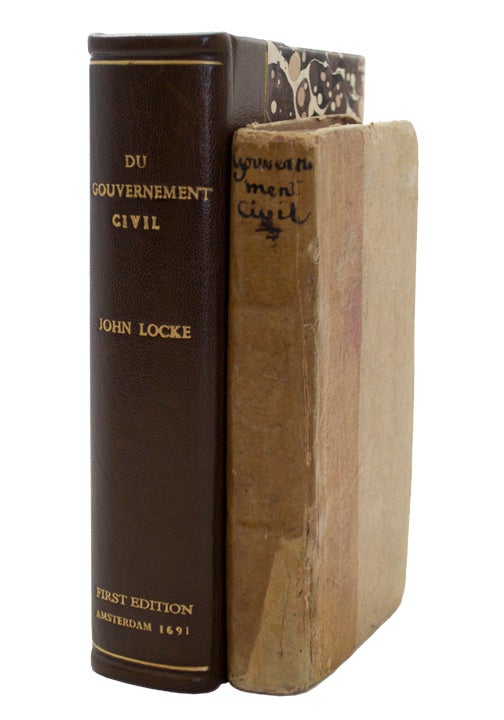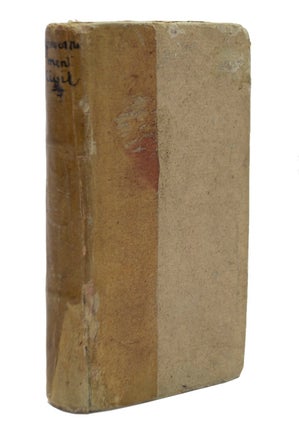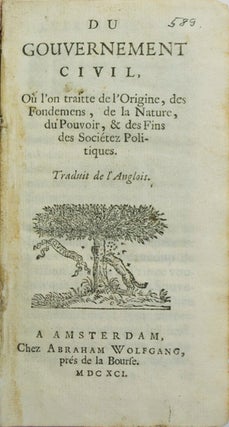Du gouvernement civil, ou l'on traitte de l'origine, des fondemens, de la nature, du pouvoir et desfins des societe politiques. Traduit de l'Anglois.
Amsterdam: Chez Abraham Wolfgang, 1691.
A Founding Document of Democracy The First of John Locke’s Works to be Translated from His Native English
[LOCKE, John]. Du gouvernement civil, ou l'on traitte de l'origine, des fondemens, de la nature, du pouvoir et des fins des societe politiques. Traduit de l'Anglois. Amsterdam: Chez Abraham Wolfgang, 1691.
First edition in French of Locke’s groundbeaking work and the first of his works to be translated from his native English. Twelvemo (5 7/16 x 3 inches; 138 x 75 mm.). [12], 321, [1, blank] pp. Title page with printer’s woodcut device. Short marginal tears to M7 & 8 (repaired and with no loss).
Contemporary light salmon paper over boards, rebacked at a very early date in similar paper, manuscript spine lettering, red speckled edges. Small number of upper blank of title and front endpaper. Housed in a quarter morocco clamshell case. Overall, an excellent copy; very clean and in a contemporary binding.
Originally published in 1690 as ‘Two Treatises of Government’. “Locke’s anonymous text is here an anonymous translation, traditionally attributed to David Mazel. ‘One of the Huguenot pastors living in Holland’, of the second treatise in its 1R version with the first chapter omitted“ (Yolton). “The second treatise contains a plain statement of the principles of democracy. In an age and country in which the practice of democracy had just been triumphantly vindicated, Locke’s theories, although anticipated to some degree by the ‘Whig’ tradition of political thought-Aristotle, Aquinas, Hooker, Grotius-had all the freshness of novelty. Like Hooker, Locke presupposes an original and necessary law of reason, and bases the constitution of society on it, rather than on the de facto existence of a government based on the actual submission of the governed to the rulers. This consent is thus a prior condition of the ‘social contract’, not a result of it, so that the civil rulers hold their power not absolutely but conditionally; government being essentially a moral trust, which lapses if the trustees fail to maintain their side of the contract. Locke was to reinforce these liberal opinions by his Letters on Tolerance, and they combine with the Treatises on Government to provide a classic example of the empirical approach to the social and political economy which has remained ever since the basis of the principles of democracy” (PMM). Its influence on the development of French and American political though cannot be overstated.
Graesse IV, 243. Printing and the Mind of Man, 163. Yolton, Locke 46. No copies of this edition have come up at auction in the last thirty years and OCLC only located twelve copies.
HBS 66937.
$6,000.
Price: $6,000.00
Item #66937



